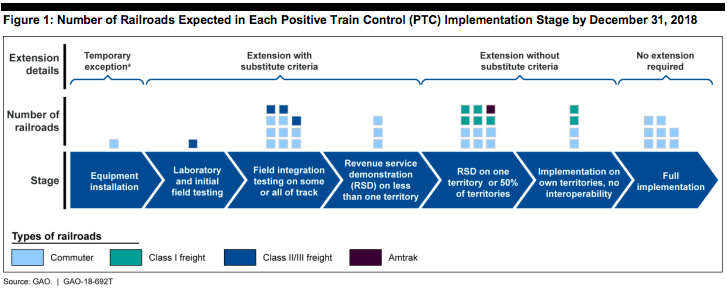Connecting state and local government leaders
Only eight railroads are expected to deploy positive train control, designed to prevent human-caused accidents, by the Dec. 31 deadline, according to a new GAO report.
Most railroads plan to request a federal extension on implementing a legally required safety measure, positive train control, beyond 2018, according to a Government Accountability Office report released this week.
PTC communications systems slow or stop trains being operated recklessly to prevent collisions, excessive-speed derailments, work zone incursions, and passage through wrongly positioned switches.
Amtrak is among 40 commuter and freight railroads ordered to execute PTC by Dec. 31, but only eight railroads—all commuter—won’t require an extension, GAO reported.
During a Thursday hearing of the House Transportation railroads subcommittee, U.S. Rep. Peter DeFazio, an Oregon Democrat, expressed frustration with the slow implementation.
“I hope ... to hear about how we are going to meet the statutory deadlines of 2018 and full utilization by 2020,” DeFazio said at the start of the meeting. “I’m concerned at some of those at the rear of the pack … There is no feasible excuse for this committee or for the agency.”
For the Federal Railroad Administration to grant a maximum two-year extension, commuter and smaller freight railroads must perform advanced field testing, known as revenue service demonstration or RSD, on at least one track segment. Only sixteen railroads, including Amtrak, will do so by the deadline, GAO reported.

Of the remaining railroads, 15 will need an extension using substitute criteria—such as initiating any field testing at all, GAO reported. Eight out of 28 commuter railroads have currently initiated RSD, while 19 have begun field testing.
A total of nine railroads are considered “at-risk” of missing PTC implementation deadlines, having failed to install 90 percent of system hardware by August: New Mexico Rail Runner, CapMetro, New Jersey Transit, Altamont Corridor Express, MARC, Trinity Railway Express, Tri-Rail, Caltrans, and SunRail.

Should FRA begin approving substitute criteria requests, a third of the railroads will remain in the early stages of PTC implementation to start 2019, and reviews take 90 days.
“These issues, combined with the ongoing implementation, testing, and interoperability challenges that a number of railroads reported to us, raise questions as to the extent FRA and the railroad industry are poised for full PTC implementation by December 31, 2020,” reads the report.
FRA Administrator Ronald Batory said at the hearing that his agency would be able to handle extension requests “within a timely period” and that the calendar, not money, was the primary barrier to compliance for all but one railroad.
“We have to bring closure to PTC 1.0, as I call it, recognizing the calendar gives us as much latitude as 2023,” Batory said. “But we can’t wait that long, and if we get it done sooner we can have a more robust, efficient PTC system that will be less money to maintain and operate.”
Small commuter rail services find themselves “at the mercy of the marketplace” when vying for the attention of a single PTC equipment vendor in a national process, said Stacey Mortensen, executive director of the Altamont Corridor Express—the smallest such service in the country.
Altamont trains are operated on host railroads, so all that is expected of the service is PTC implementation on six locomotives and eight cab cars, setting up a back-office server, and crew training.
“Our PTC equipment was ordered in March of 2017, well in advance of this year’s deadline, well in advance of being able to work with our host railroad partners on the testing,” Mortensen said. “But because of the many other orders, and important orders across the county, the equipment was not delivered until April of this year.”
Vendors then took time establishing a site workforce, she added, and a water intrusion recall on PTC antennas already ordered will require equipment replacement.
National Transportation Safety Board Chairman Robert Sumwalt questioned the FRA’s “lack of action” and the number of exemptions.
Positive train control was mandated by the Rail Safety Improvement Act of 2008, after a train collision in the Chatsworth district of Los Angeles claimed the lives of 25 people. Since then, NTSB reports 22 mass-casualty train accidents due to human error responsible for 29 deaths, more than 500 injuries and $190 million in damages.
“Significant portions of the nation’s rail network,” or 60 percent, will remain unprotected by PTC after the initial rollout, Sumwalt said, including 14,000 miles of Amtrak mainland track in cities like Topeka, Kansas; Portland, Maine; and New Orleans.
“Here we are—10 years later and nearly three years after the original deadline mandated by Congress—and we still do not have PTC fully implemented in the United States,” Sumwalt said. “Is that acceptable?”
Dave Nyczepir is a News Editor at Government Executive’s Route Fifty and is based in Washington, D.C.

NEXT STORY: Despite Warnings, States in Florence’s Path Continued Coastal Development




